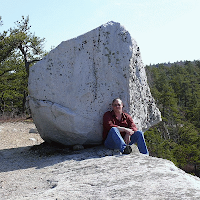Every fall semester, I teach a laboratory course on Physical Geology and one of the topics, of course, is minerals. In looking at minerals, students learn a lot of terminology including words to describe a minerals crystal "habit" or shape.
Many of the terms are self-explanatory like cubic, platy, and fibrous. Others are a bit more exotic including the term botryoidal which is unfamiliar to most students.
The term is derived from two Greek roots - botrus (βότρυς) which refers to a bunch of grapes and eidos (εἶδος) meaning resemblance or likeness. It's a mineral that grows bulbous masses which (roughly) resemble a bunch of grapes.
A couple of common examples below:
Hematite - Fe2O3
Malachite - Cu2CO3(OH)2
Rhodochrosite - MnCO3
Now you know a word you may not have before. Go off and impress your friends.





No comments:
Post a Comment